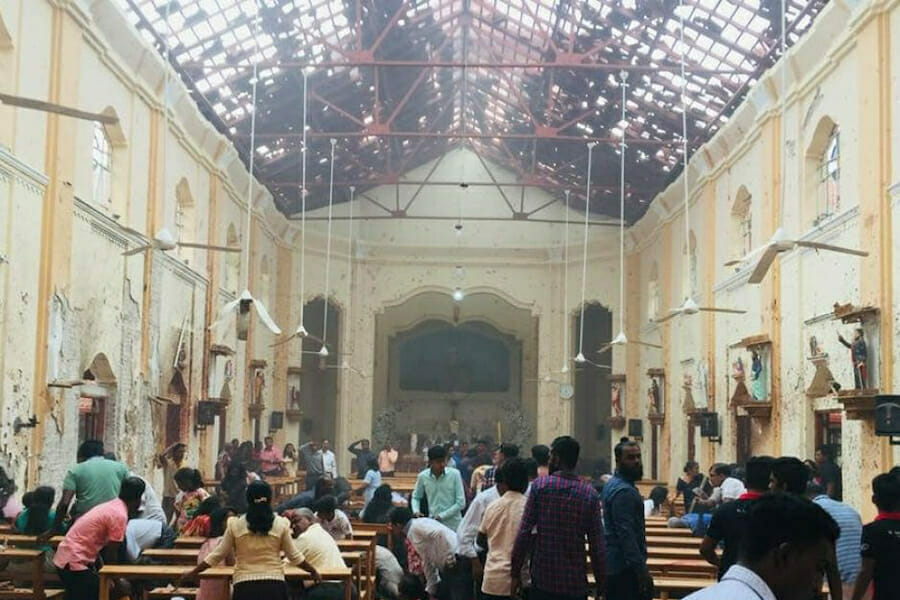
U.S. Should Not Repeat its Post 9/11 Counter-terrorism Mistakes in Sri Lanka
The U.S. government’s hurried moves to expand military-to-military cooperation with Sri Lanka to fight terrorism after Easter Sunday’s bomb blasts is ill-advised because Colombo’s counter-terrorism policies are in shambles. Sri Lanka targets ethnic communities for acts of terrorist groups, and its military, enjoying impunity, uses torture as the main means to investigate terrorism. History has shown that the U.S.’s post 9/11 policy of partnering with militaries that had dubious human rights records did not eradicate terrorism or keep Americans and their interests safe. The U.S. should not repeat its mistakes in partnering with Sri Lanka.
On April 21st, 2019, Easter Sunday, six bombs went off in Sri Lanka, killing more than 250 people, including five Americans. The Sri Lanka government identified the perpetrators as a local group called National Thowheeth Jamath (NTJ), working with international help to carry out the attack. Two days later ISIS claimed responsibility for the attack. That seemed to be the spur Washington needed to reorient its foreign policy towards Colombo from one that was development centered with some counter-terrorism features (joint military-to-military training and intelligence sharing) to an expanded military-centric counter-terrorism focused foreign policy.
In a statement issued after the U.S.-Sri Lanka Joint Partnership Dialogue, the United States and Sri Lanka agreed to expand their military to military cooperation, saying “The United States offered to continue to expand counter-terrorism and maritime and border security cooperation with Sri Lanka.” The two governments are still in discussion on the exact nature of the expansion.
Sri Lanka’s Counter-Terrorism Policy
As the U.S. opens a new front to counter ISIS partnering with Sri Lanka, the Indian Ocean Island’s own doctrine in blocking and containing terror has been met with widespread international condemnation. As Ben Emerson, former UN Special Rapporteur on Counter-Terrorism and Human Rights, put it, “Sri Lanka’s counter-terrorism policy is a recipe for disaster.” He went on to say why: “the biggest problem they have in Sri Lanka is discrimination against national minorities, particularly the Tamil community, who are primarily Hindu, and the Muslim community. And the biggest social problem is the disenfranchisement of these minorities and continuing persecution by public officials from the majority Sinhalese Buddhist community.”
Emerson’s diagnosis is spot on. Following the bombings, the Sri Lanka government’s tactics to prevent more terror attacks was to target the Muslim minority. Colombo armed itself with sweeping emergency laws that give the military and police widespread powers including that of arrest and detention with little or no judicial oversight. Using these and other legislation, the government banned the niqab, which also turned into a de-facto banning of hijab and other head coverings. It must be kept in mind that in the videotapes of the suicide bombers made public, not one wore the niqab, hijab nor any garment that linked them to specific markers of Muslim cultural identity. The suicide bombers were all wearing western clothes and carrying backpacks.
The relentless targeting of Muslims as a community has had consequences. Since the attack, there has been rioting against Muslims with at least one reported death of a Muslim man on May 13th. Despite the curfew and the draconian emergency powers, the military and the police did little to quell the riots.
Colombo’s penchant for carrying out counter-terrorism operations targeting communities goes back to its fighting the Liberation Tigers of Tamil Eelam (LTTE) rebels in its 30-year civil war. In a bizarre development fusing past and present, on April 30th, the military called several former LTTE cadres and asked them to be on the “military’s side” and act as spies. This strategy is a throwback — although in reverse — to what happened during the civil war. Then, successive governments armed Muslim home guards to fight against the LTTE and Tamil civilians. This caused much hardship to both the Tamil and Muslim populations in the North and East of Sri Lanka and created enmity between the two peoples that even the end of hostilities has not obliterated. The military asking ex-LTTE cadres today to provide intelligence on the Muslims is the reverse of that process although with the same objective of dividing and ruling minorities by fanning sectarian tensions.
Use of Torture
Moreover, Ben Emerson points to the fundamental reason Sri Lanka’s counter-terrorism structure cannot be reformed: the “main means” the state uses to investigate terrorism is torture. Emerson said he saw victims of torture during his visit in 2017. The prevalence of torture in Sri Lanka has been well documented and the U.S. Congress has condemned Sri Lanka’s use of it. Studies looking at the U.S’s own use of torture for counter-terrorism post 9/11, have found that it greatly damaged national security. “The number of lives lost not lives saved…because we mistreated people, was a sad moment of incompetence,” said Frank Anderson, former chief of the CIA’s Near East and South Asia division. Clearly, torture does not work, is illegal, immoral and does not provide security. Therefore the U.S. relying on information that is generated by torture will not counter-terror.
In addition to using torture as an investigative tool, Sri Lanka’s military is accused of crimes against humanity. Despite the UN finding credible evidence of the military’s involvement in mass atrocities during the civil war, and there being credible evidence of torture and disappearance continuing after the war ended, no military personnel have been held accountable. The military investigated itself and exonerated itself despite what the UN said.
Such impunity bred by self-exoneration has a direct link to investigations of the Easter attack. Indian intelligence warning of an attack in early April flagged that a former member of the Sri Lanka military was involved in allegedly training the suicide bombers. Cabinet spokesperson, Minister Rajitha Seneratne, quoting intelligence reports said on May 1st that an army intelligence officer was the secretary of the NTJ. Seneratne accused a former major general of the Sri Lankan army who coordinated both the Muslim extremist group as well as a Buddhist extremist group to create instability in the country.
Given Sri Lanka’s history of impunity, the question is who will investigate the allegations of links between the military and the suicide bomber network? Will the military investigate itself again?
Following the Easter bombings, Sri Lanka’s President Maithripala Sirisena instituted an Overall Operational Command (OOC) where eight military commanders would be in control of the deployment of thousands of troops in Sri Lanka engaged in search and seizure, enforcing curfew, patrolling civilian areas and executing current emergency regulations. All eight of the military commanders stand accused of war crimes in Sri Lanka’s 30-year civil war or sexual misconduct as peacekeepers in Haiti.
This is the military that the U.S. will be extending its cooperation to as a partner.
Post 9/11, the U.S. partnered with militaries of dubious human rights records, such as Saudi Arabia and Lebanon. It was then caught in a quagmire where it had to fight its partner forces’ sectarian battles and look the other way when human rights abuses were committed.
History has shown that such partnerships did not eradicate terrorism, strengthen American security nor help the security in their partner countries. Therefore, the U.S. should learn from its past mistakes and ensure that the Sri Lanka military is held accountable for its past conduct and that it adheres to its human rights commitments before continuing with military cooperation.

